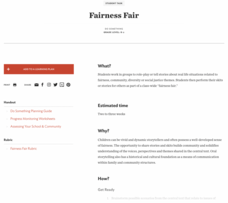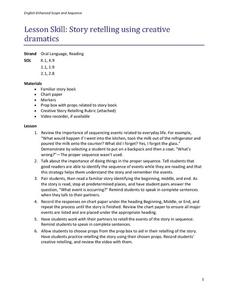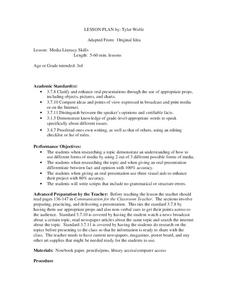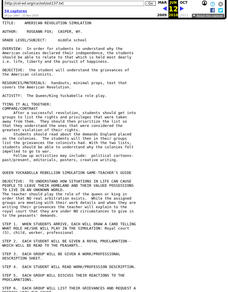Curated OER
Lesson 1- Set Design
Line, shape, color, texture, space. The first in a three-part series of lessons intended for advanced theatre arts classes introduces the elements of set design. Class members examine maquettes and analyze how designers have put together...
Great Books Foundation
The Glass of Milk
It's not easy to ask for help. Learn why a boy on a ship struggles with accepting help in "The Glass of Milk," a short story by Manuel Rojas. Six discussion questions prompt class members to make inferences from the text about character...
Shakespeare Globe Trust
Fact Sheet: Indoor Theatres
Pull up a cushion, grab an apple or some nuts, light a candle, and get ready to explore indoor theatres from Elizabethan England. Readers use a handout to distinguish between indoor and outdoor theatres and the types of actors who...
College Board
Random Variables vs. Algebraic Variables
Variables can vary in meaning. A reference material for AP® Statistics explains the difference between random and algebraic variables. It provides a hypothetical situation involving dice—great for use in a classroom situation.
Curated OER
The Bill of Rights and You
The right to life, liberty, and the pursuit of happiness. The lesson explains what the Bill of Rights is and how it applies to everyday life, like freedom of speech or the right to a jury trial. Young historians complete hands-on...
Teaching Tolerance
Musical Movement Showcase
Young performing artists create a song or choreograph a dance to illustrate a theme in a text they are reading. Step-by-step directions are included.
Teaching Tolerance
Fairness Fair
How can we create a more fair world? Chances are, class members have some ideas! After reading a text about fairness, individuals create skits around the ideas of fairness. Extend the learning and make their presentations a...
Curated OER
Story Retelling Using Creative Dramatics
Doing things in the proper sequence is the focus of a solid language arts lesson. In it, pupils discuss the importance of doing things in the right order. Then, they pair off and read a short story together. They must retell the story to...
Curated OER
Amazon Water Cycle Role Play
Pupils participate in a role play where they play clouds, the ocean, rain drops, and more in order to learn about the water cycle. In this water cycle lesson plan, students have discussions and learn vocabulary.
Curated OER
The ABCs of Conservation
Students identify the letters of the alphabet and corresponding sounds and words that begin with that letter.
Curated OER
The ABCs of Conservation
Students explore the components of convservation, letters, and the sounds of the alphabet. The letters of the alphabet and the corresponding sounds and words that begin with that letter are identified as ways of protecting the Earth are...
Curated OER
Lady Macbeth's Cure
Students role-play the position of Lady Macbeth's nurse. They are to create a project or service that can cure her sleepwalking. They create their own commerical to sell their product.
Curated OER
Outgroup Experiment Reveals Bias, Stereotyping
Exploring bias and stereotypes, students dress up as members of "outgroups" (groups of people who are often judged). Though the instructional activity specifies that it should be "respectful and not mock the outgroup in any way," this...
Curated OER
Founders of the Children's Rain Forest (Open Court)
Fifth graders read a narrative nonfiction piece describing the formation of the Students's Rain Forest organization from the SRA/McGraw-Hill Open Court Reading Anthology entitled, Cooperation and Competition. Founders of the Students's...
Curated OER
I'm a Creature, You're a Creature, Wouldn't You Like to Be a Creature, Too?
Third graders demonstrate an understanding of the lifestyles and habits of the underwater life presented in the previous unit. They classify the various sea creatures according to the ecosystem and then use drama skills to present...
Curated OER
Introduction to 18th Century Artisans
Students investigate colonial artisans. In this history lesson, students create a booklet of American Artisans and dress up in 18th century clothing for an oral presentation.
Curated OER
Reader's Theater
Conduct a Reader's Theater. Third, fourth, and fifth graders rewrite books with a baseball theme to a Reader's Theater format. They form groups of four or five, practice reading the script, and then perform it for an audience.
Curated OER
Witness to a Brawl
Using The Musicians' Brawl, middle schoolers first impressions and the effect the title has on a piece of work. Then they analyze the narrative elements to art and write a newspaper article for the painting. In this narrative art lesson,...
Curated OER
On the Scene: Analyzing Scenes in Film and Literature
Students examine how a scene in a movie or in literature is constructed. In this film and literature lesson students answer questions based on film clips then create storyboards depicting a scene from their life.
Curated OER
Drama from Animal Characters
Learn about animal habitats, characteristics, and writing in a different perspective. The class composes a narrative from the perspective of a fresh water animal, they include a problem and the animal's reaction to the problem. The...
Curated OER
Media Literacy Skills
You're on camera! Third graders find a news story and research it to get more information. Everyone uses their found information to write a script and create their own news broadcast!
Denver Art Museum
From the Hat’s Point of View
Here is a lesson designed for pre-schoolers and kindergartners that will pique their imaginations. They study images of a very interesting ceremonial hat from China's past called a Summer Official's Hat. These hats were worn by people of...
Curated OER
American Revolution Simulation: Colonial History, Drama
Students explain why the American colonies declared the independence, students should relate to that which is held most dearly i.e. life, liberty and the pursuit of happiness. They participate in a drama that illustrates this.
Curated OER
Understanding Stage Design: Using Visual Elements to Provide Information to an Audience
Students study about theatrical design by developing environments for improvised and scripted scenes. They develop focused ideas for an environment using visual elements.
Other popular searches
- Storytelling Props
- Storytelling With Props
- Story Telling With Props
- Courtroom Props
- Retelling Props
- Drama Game Props
- Retelling + Props
- Theater Props
- Dance Props
- Clara Barton Props
- Transformation of Props
- El Tempo Props

























